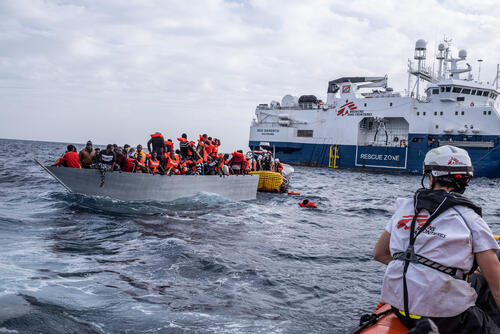Data and information from International Activity Report 2023.

23
23
€9.6 M
9.6M
2015
2015
In 2023, more than 2,500 people died or went missing as they attempted to cross the Central Mediterranean Sea by boat – the deadliest toll since 2017. Sea arrivals in Italy surged by 50 per cent compared to 2022, with Tunisia overtaking Libya as the main departure point. This significant increase in departures, coupled with the lack of state-led rescue capacities, resulted in more boats in distress and shipwrecks.
Once again, our teams witnessed first-hand the impacts of violent border practices and the deliberate inaction of European states in the Central Mediterranean. On board our rescue ship, the Geo Barents, our team treated survivors for hypothermia, dehydration and seasickness, the consequences of the harsh conditions at sea. Patients also had burns resulting from prolonged contact with boat fuel, as well as skin infections and wounds linked to the horrific conditions in detention centres in Libya. Many people reported having been subjected to extreme levels of violence, including sexual violence, in their countries of origin and/or in transit countries.
Meanwhile, new policies and practices implemented by the Italian authorities have created further obstacles to lifesaving humanitarian activities at sea. For example, NGO ships now have to proceed to port after each rescue, forcing them in some cases to ignore other alerts of boats in distress.
NGO ships were also sent to faraway ports in northern Italy to disembark survivors, despite closer ports being available. These measures critically limited the time NGOs spent patrolling the sea searching for people in distress. In 2023, the Geo Barents lost 100 days navigating to unnecessarily distant ports and was detained for 20 days for non-compliance with the new law.
MSF continues to denounce the deadly consequences of European migration policies, and calls on European institutions and member states to prioritise the safety of people arriving on Europe’s shores.



